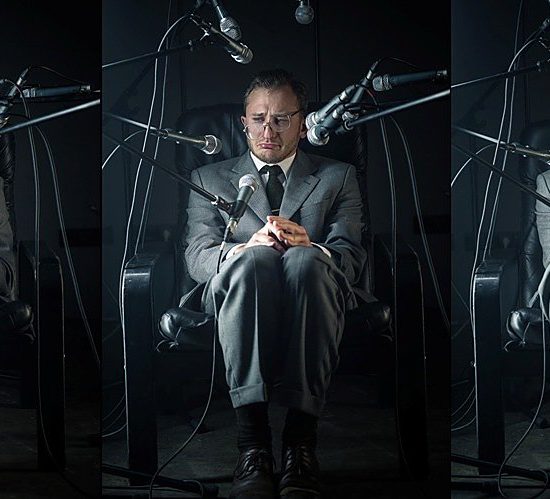Vox, Logos, Fallos
“The stone which the builders refused is become the head stone of the corner.”
Ps. 118:22
[…]
It seems that in “Krapp’s Last Tape” the key passion of director Oskaras Koršunovas was to reach the essence of the play while avoiding old age as the fundamental element of its pathos. The director achieved his goal through wise organization of the space.
The performance starts at the door. Entering the dark room through the doorway covered with a heavy black curtain, members of the audience immediately become participants of a “room theatre” performance. They hear cacophonous sounds made by piano strings strummed by Gintaras Sodeika. The number of chairs seems to be deliberately reduced. Actor Juozas Budraitis (Krapp) sits slumped in one of the chairs. He is dishevelled and murmuring something incoherent.
Such premeditated arrangement of the audience (reminiscent of the Chinese Emperor’s terracotta army soldiers) is a flashback to the times of “room theatre”. Koršunovas always bases his performances on a very specific, easily palpable genre, each time a different one. The “room theatre” genre, popular during the days of the Soviet “underground”, has contributed to the director’s ideas and the main character’s existence. Luckily, the director managed to avoid the unattractive, but nowadays quite popular genre of a “corporate party”. Had the opposite been the case, all the implications and passions of the play would have been in vain.
[…]
I had been anxious about how Koršunovas and Budraitis would solve the problem that most of the text comes from a tape recorder? Their version of “Krapp’s Last Tape” is the only version I’ve seen where this paradox is successfully resolved.
At first glance, there’s nothing special, either in acting, or directing. Yet, the play vividly conveys the essence of Beckett’s texts. After all, they can only be properly understood when the opportunity to hear their sacred sound is created, and Koršunovas is a director who raises every play he directs, whether modern or classic, to the level of modern mythologisation.
We are talking about the sacredness of the sound, intonation, rather than the content. In this case, old age, embodied by the actor in the performance, as an objective phase of a person’s existence between the feeling of death’s inevitability and a direct connection with the will (whim?) of Destiny (God?), creates that sacred sound and tempo-rhythm, combining in itself both the lower (the human wretchedness) and the upper (fatality of the Divine will) registers.
The texts of Krapp as an old man – performed by Juozas Budraitis – belong to the sphere of self-reflection. They are a certain verbal “mirror”, in which, like in a magic “hallway of mirrors,” the same image is numerously multiplied and changed, and the recording is just one of the reflections. The novella about young Krapp’s erotic experiences in a boat is heard from the tape twice (as in the play), and it just proves once again that this whole process is only the “bolero” finale of a person’s life permeated with the vertical of meaning, the “endgame” of a meaningful existence.
Krapp staggers across the acting space between the audience, a table with a tape recorder and a cabinet with drinks, dragging pieces of tangled tape like the “guts” of the needlessly wasted time of his life. It’s not the only imposed metaphor though; one can not help noticing a black ball on the wall, which looks like the lampshade of a lamp that is never turned on. In the play Krapp also talks about the black ball which he once threw to a white puppy and can not forget…
A little black ball, as the meaning of a life lived in vain, a round rubber toy in the mouth of a playful animal – this is not the “head stone of the corner,” but, rather, a thing that has never belonged to the category of head stones. A powerful symbol embodied in the set design of the play (designer Dainius Liškevičius).
The end of the performance is accompanied by an ironic sentimental piano theme stylized by Gintaras Sodeika – not unlike James Horner’s tune from the movie “Titanic.” The irony of Beckett’s text, relativity of its images and statements, together with the Freudist base of its content, the unity between the voice, speech and vital sexuality have been rendered by the director and the actor in a way that is readable and understandable.
And a few words from my own experience. Those who have held the hand of a dying man in the split second when he or she bid farewell to this world, could read in their eyes the last three thoughts going through the mind of a dying person: a) deep astonishment at the fact that it is already the end of everything, b) understanding that they should have lived their life in a completely different way; c) the impossibility to change anything. The tragedy of life lies in the junction of those three truths.
If we agree with the statement that every work of art (not necessarily theatre) is a flat pattern of the essential moment of a person’s life, then “Krapp’s Last Tape” by Beckett-Koršunovas-Budraitis can be understood as an impressive scenic flat pattern of the above-described moment…
Now I am going to turn on my old open reel tape recorded, load it with a “spool” from my own archive and listen to a recording of “Krapp’s Last Tape” made by Požemio teatras (Undeground Theatre) in 1973… And eat a banana. No, two bananas. Or maybe three. No, I’ll be fine with two. I love bananas!



